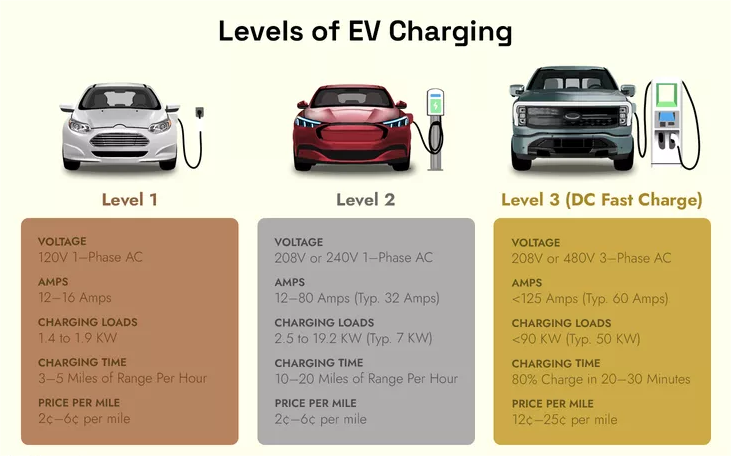Introduction
The automotive industry is undergoing a transformative shift towards electric vehicles (EVs), and as more individuals make the switch to greener transportation, the need for accessible and convenient charging solutions becomes increasingly evident. While home charging is an excellent option for many EV owners, the workplace is emerging as a crucial battleground in the expansion of EV infrastructure. In this article, we’ll explore the rise of EV charging at the workplace, the available solutions, the benefits for both employers and employees, the associated costs, and how investing in workplace EV charging stations can be future-proof.
The Climb of EV Charging at the Workplace
The workplace has become a focal point for EV charging infrastructure due to several key factors:
Proliferation of Electric Vehicles
The adoption of electric vehicles has been steadily rising, and many employees now own EVs. Offering charging stations at the workplace caters to this growing demand.
Extended Work Hours
Employees spend a significant portion of their day at work, making the workplace an ideal location for EV charging. Charging during working hours helps maximize an EV’s daily range.
Sustainability Initiatives
Many companies are committed to sustainability and reducing their carbon footprint. Installing EV charging stations aligns with these goals and demonstrates corporate responsibility.
Attraction and Retention
Offering workplace EV charging can be an attractive perk for employees, aiding in recruitment and retention efforts.
Workplace EV Charging Solutions

Employers have several options when it comes to implementing EV charging solutions at the workplace:
Level 1 Charging (110/120V)
Level 1 charging involves using a standard electrical outlet (110/120V) and a portable charging cord that comes with the EV. While it’s the most basic option, it’s also the slowest, suitable for overnight charging.
Level 2 Charging (240V)
Level 2 charging provides faster charging than Level 1. Employers can install dedicated Level 2 charging stations with wall-mounted charging or pole-mounted units, our EV charging stations are support both installations. These stations offer convenience for employees, as they can charge their vehicles during the workday.
DC Fast Charging
For workplaces with high EV traffic or those looking to provide rapid charging, DC fast charging stations are an option. These stations can provide a significant charge in a short time, making them suitable for quick top-ups during breaks.
Networked Charging Stations
Networked charging stations, often connected to a central management system, allow for tracking and monitoring of usage, remote access, and potential billing options for employees or visitors.
Benefits of Workplace EV Charging Stations
Attraction and Retention of Talent
Providing EV charging as an employee benefit can attract and retain top talent, especially among environmentally conscious individuals.
Increased Employee Productivity
Employees with EVs can use workplace charging to ensure they always have a fully charged vehicle, reducing the need to leave work to charge or deal with range anxiety.
Sustainability Commitment
Installing EV charging stations demonstrates a commitment to sustainability and can enhance a company’s reputation as an environmentally responsible organization.
Cost Savings
Many companies offer EV charging as a free or subsidized benefit. However, some may choose to charge employees for usage, potentially offsetting installation and electricity costs.
GREENC’ EV charging stations are supported OCPP, RFID and APP functions, it’s convenient for companies to manage the EV charging system, and also easy for employees to power their EVs.
Regulatory Compliance
Some regions or municipalities have regulations that require a certain number of EV charging stations for commercial buildings. Installing workplace EV charging can ensure compliance with such requirements.
Costs of Workplace EV Charging Stations
The cost of installing EV charging stations at the workplace can vary significantly based on several factors:
Charging Infrastructure
The type of charging stations you choose (Level 1, Level 2, or DC fast charging) and the number of stations impact the upfront costs.
Electrical Upgrades
Depending on your existing electrical infrastructure, you may need to make upgrades to support the increased power demand of charging stations.
Permitting and Installation
Costs associated with permitting, installation, and electrical work can add to the overall expense.
Networked Stations
If you opt for networked charging stations with advanced features, there may be additional subscription or software licensing costs.
Ongoing Maintenance
While EV charging stations are generally low-maintenance, budgeting for occasional maintenance and repairs is advisable.
It’s essential to conduct a cost-benefit analysis to determine the return on investment for workplace EV charging stations. Consider factors like increased employee satisfaction, recruitment, and sustainability goals when evaluating the costs involved.
Future-Proofing Workplace EV Chargin

Scalability
Design your charging infrastructure with scalability in mind. As the number of EV-owning employees grows, you can expand the charging capacity accordingly.
Universal Compatibility
Choose charging stations and connectors that are compatible with a wide range of EV models. Future-proofing means ensuring that newer EVs can still use the existing infrastructure.
Network Connectivity
Option for charging stations that can be updated remotely and integrated into a central management system. This allows for flexibility and adaptability as technology evolves.
Regulatory Awareness
Stay informed about local and national regulations regarding workplace EV charging. Compliance with evolving standards and incentives can be financially beneficial.
Renewable Energy Integration
Consider sourcing electricity from renewable sources for workplace charging stations to align with sustainability goals and reduce the carbon footprint further.
Conclusion
Workplace EV charging stations are not just a trend but a strategic investment in the future. As electric vehicles become increasingly popular, providing employees with accessible and convenient charging solutions can yield numerous benefits, from attracting and retaining talent to demonstrating a commitment to sustainability. While there are costs associated with installation and maintenance, workplace EV charging can be future-proofed by considering scalability, compatibility, network connectivity, regulatory compliance, and renewable energy integration. As the automotive industry continues its transition toward electric mobility, the workplace is poised to play a pivotal role in supporting this transformation. If you’re looking to set up EV charging stations at your workplace, it’s a good idea to have a look at our workplace solutions to learn everything you want to know.








